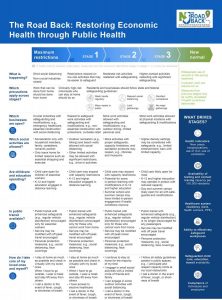After months of waiting, clubs in a number of states are now opening (some at 25% capacity, some at 50% capacity). That’s great news! But what is the status of clubs in New York, New Jersey, and Pennsylvania, and what are clubs in those states doing to prepare for their eventual reopening? Jeff Levy, Executive Director of ACE New York, ACE New Jersey, and the PHEA (Pennsylvania Hospitality Entertainment Association) joined the ED Webcon on 5/28 to discuss everything he and the operators in those states are doing to ready themselves, their staff and entertainers.
Jeff Levy has been communicating with his statewide chapters on a regular basis throughout the COVID crisis, constantly engaging them with emails and teleconferences to ensure that club owners/operators were aware of all of the latest COVID developments. This has included the SBA/PPP loans, as well as CDC guidelines and statewide “phased” opening information. Levy was joined by John Meehan of the Cheerleaders clubs, to discuss how he views reopening.
Levy started off by mentioning how New York, New Jersey, and Pennsylvania have all adopted similar rules for reopening.
“Governor Andrew Cuomo, Governor Phil Murphy in New Jersey, and Governor Tom Wolf in Pennsylvania — they all have joined as one unit, almost one state,” said Levy. “That’s almost 35 million people in those three states.”
While New York and Pennsylvania are opening county by county, when deemed safe enough, Levy said New Jersey is opening as a whole.
Criteria for reopening centered on continued declines in hospitalizations, hospital deaths, new cases, and available hospital and ICU beds.

“They take these metrics and give it a number,” said Levy. “The good news is you have to meet 7/7. Two days ago, the only part of New York that was still looking to open up because they hadn’t met the criteria were Long Island, Mid-Hudson, and NYC. This morning (May 28), Long Island and Mid-Hudson met the criteria. New York City hasn’t met it yet.”
“The question would be if I meet the threshold, can I just open up?” continued Levy. “The answer is no.”
Once a threshold is met, two weeks have to elapse before the next phase. So, for instance, if a club met the criteria on June 15, they wouldn’t open until July 15.
“I also find that NY, NJ, and Penn have the most stringent reopening process of anywhere in the country,” he said, reflecting on a conversation he had with a Florida based club owner that opened with looser restrictions.
“Since this thing started, we gathered info immediately,” Levy added. “I spoke with the governor’s office in all three states, spoke with the department of health and human services; we have bill- tracking services that bring up anything pertinent, not just proposed laws; we spoke to state representatives to gather info that would help and benefit our industry.”
I feel like I’m working harder now than I did when the clubs were open, just trying to figure out what’s best and how to open up. — John Meehan, Cheerleaders
Ultimately, despite all the answer-seeking, the truth for New York, New Jersey, and Pennsylvania — like much of the world — is a murky picture, not crystal clear.
Levy did say clubs with their eye on opening should take all proper precautions, in addition to adhering to whatever local ordinances are in place. That includes social distancing, appropriate signage, minimizing pedestrian traffic flow and congregating areas, to-go everything, masks, staggering employee shifts, thermal scanning, frequent hand-washing, and more.
“Everything seems to be running low so get whatever supplies you may need — sanitizing products, thermal scanners, gloves, etc.,” he said while touting NexClean, a mobile disinfection company Levy has utilized.
John Meehan, owner of Cheerleaders clubs in Pennsylvania, has used NexClean as his clubs prep to reopen.
“I feel like I’m working harder now than I did when the clubs were open, just trying to figure out what’s best and how to open up,” he said.
One tidbit he had for club owners was to post videos of the cleaning process to their social media sites to let wary customers know the lengths they’re going to for safety.

“The positive feedback we got from that, not only from our customer base but also our employees and entertainers, was just amazing,” Meehan said. “Our customer base is going to feel comfortable and safe to be able to come back.”
That is the question on owners’ minds in Levy’s tristate area and beyond: what is it going to look like when customers come back?
Despite the industry’s best efforts, Levy maintained it’s unclear for everyone.
“This is the worst situation our industry has ever seen,” Levy said. “We would fight all the bills and we would win, or take them to court, or produce a study and somehow we always won. This time, nobody has a game plan.”
Cost segregation
Kevin Cawley from Cost Segregation Services stopped by to briefly explain how he has already helped one club operator, Curtis Wise, with cost segregation, and how he may be able to help other owners as well.
All properties in the US have to be on a depreciation schedule. What happens is there are a lot of pieces and components that make up a depreciation schedule and the parts and pieces of a property don’t all last 39 years but the government wraps them all up into one asset. They call that asset a building and they depreciate it over 39 years.
Let’s say you buy a club for $1 million. In that case, the IRS would determine you need a depreciation schedule. They take the purchase price ($1 million) and divide it by 39 which is approximately $25,600.
“That’s a standardized write-off I’d get from year 1 to year 39, every year. The issue with that is not every part, piece, component in your building will last 39 years, so what cost segregation is a specialist comes in, like myself, and I segregate every part, piece, component, and building system that won’t last 39 years, I put it on its correct depreciation schedule, which would be 5, 7 or 15. That gets you a much larger write-off in the earlier years of ownership. It’s important to note, my company isn’t creating any more value, we’re front-loading your depreciation schedule.
For more information:
Jeff Levy
(561) 939-8042
Kevin J. Cawley
Cost Segregation Services, Inc. www.costsegkev.com
(773) 931-6498
This article is provided for general information purposes only and is not intended to provide either an exhaustive analysis of these matters or any specific legal advice or recommendation. Laws vary by state and municipality. Club operators and others are strongly encouraged to consult their own attorneys and accountants for specific advice on how these issues will affect their businesses and what measures to take.
For more information be sure to follow our social media pages, including Facebook and Instagram, visit ExoticDancer.com, and email ED’s Dave Manack at dave@edpublications.com.





























